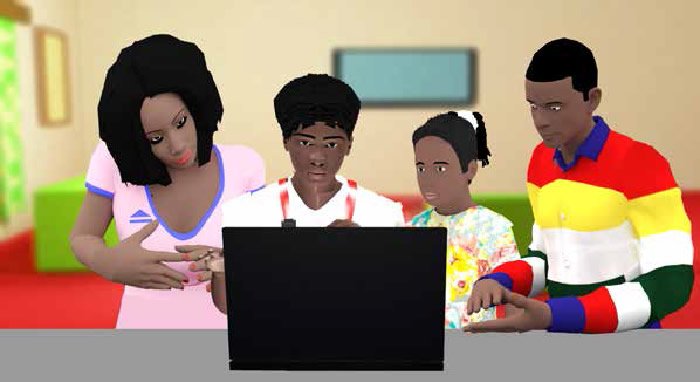
The internet has abundant merits and demerits. Notwithstanding, it offers profound knowledge to several users including young ones. It’s for this reason that kids should be monitored constantly when online to protect them from the dangers of the internet.
A cybersecurity expert, Olugbenga Odeyemi, noted that parents should take cognisance of what their kids consume on the Internet and streamline kids’ internet accessibility to beneficial ones.
He noted that over time, experts had realised the difference between parents who are open to training their kids early on Internet usage and those unaware of information and exposure.
He said, “The Internet is like s3x, sooner than later, your kids will learn about it. You either get them started early on how to use it right or wait until they have learnt the things you’re avoiding.”
The expert, however, listed ways in which parents can keep their children safe online.
Introduce them to Internet education
Odeyemi explained that parents must educate themselves about digital tools and ensure their kids begin early education.
He noted that in his organisation, parents often push their technology naivety into their kids, adding that such often leads to unnecessary fears about technology and the Internet.
He added, “What education does for the parents is to help them understand available tools and keep them up-to-date with technological events. Proper education helps the kids channel their knowledge in the right direction. It’s said that when the purpose of a thing is not known, abuse is inevitable.’’
Create child accounts
He explained that when setting up the computer, phones, and tabs, it should be set up with the age of the child because most platforms have built-in functionality to prevent kids from doing what adults do online. He noted that setting up an account with one’s details and giving it to kids for use would endanger them.
Link kid’s account to yours
“When you set up a child account, also set up an adult account to manage the child. Or attach the new child account to your existing adult account. What this does is that it ensures that whenever they want to change settings or go beyond what’s available for kids you will be notified.”
He further advised parents to monitor kids’ activities, not by policing them but by paying attention to the things they do and the content they consume. He also said that it was important for parents to be internet educated. “Some of these popular platforms send a weekly or monthly summary of the activities in the kid’s account,” he said.
Buy age-appropriate devices
There are phones, tabs, and computers specifically made for kids. Buying adult devices for kids would endanger them.
Pay attention to age ratings
Odeyemi noted that it was pertinent for parents to take note of the age ratings of the contents their kids consume. He explained that multimedia content comes with age ratings due to certain reasons to ensure the right content for only the right age group.
He said, “This is valid for cartoons, video games, cable TV channels, music, movies, computer software, internet devices and websites. When a cartoon is rated age nine and above, don’t allow kids below age nine to watch it. Those numbers are not mere labels. When hip-hop music is rated 18, a parent/guardian/school shouldn’t allow kids below 18 to listen and dance to such music. Kids pay attention to words and actions and we must do everything as responsible adults to protect them.”
Be the first example
He stated that parents should be careful of the content they consume online, especially in kids’ presence. Odeyemi said, “If you’re unable to stop your bad habits, please do well to ensure you keep them away from your kids or the kids around you. Kids often do as adults do, not as adults say.”
Speak to a professional
The expert, who said that many African parents were too religious, noted that parents should not brand everything they didn’t understand as demonic or evil.
He noted, “They will eventually know more than you know whether you like it or not. It will help you a lot if you build trust by responding to unknowns from an educated point of view as opposed to making unfounded accusations. Before you accuse your kids, be sure to ask a professional for guidance.”
Odeyemi also advised parents to go beyond conventional school education and be open to learning. He noted that some kids in his organisation were already building games, animated stories, mobile apps and websites.
He said, “We have trained six-to-10-year old kids to do these things. Some have also learned how to use digital tools to promote their academic work. Their parents are preparing them for the future. What future are you preparing your kids for?”





